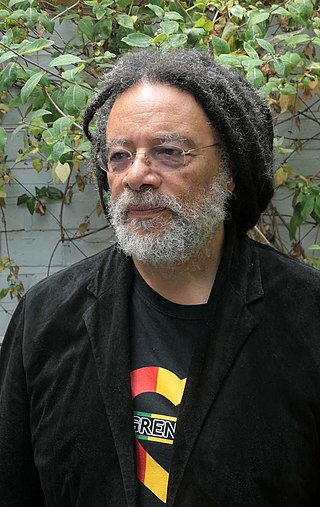Related Research Articles
Race is a categorization of humans based on shared physical or social qualities into groups generally viewed as distinct within a given society. The term came into common usage during the 16th century,when it was used to refer to groups of various kinds,including those characterized by close kinship relations. By the 17th century,the term began to refer to physical (phenotypical) traits,and then later to national affiliations. Modern science regards race as a social construct,an identity which is assigned based on rules made by society. While partly based on physical similarities within groups,race does not have an inherent physical or biological meaning. The concept of race is foundational to racism,the belief that humans can be divided based on the superiority of one race over another.
An ethnicity or ethnic group is a group of people who identify with each other on the basis of perceived shared attributes that distinguish them from other groups. Those attributes can include a common nation of origin,or common sets of ancestry,traditions,language,history,society,religion,or social treatment. The term ethnicity is often used interchangeably with the term nation,particularly in cases of ethnic nationalism.

Mestizo is a person of mixed European and Indigenous non-European ancestry in the former Spanish Empire. In certain regions such as Latin America,it may also refer to people who are culturally European even though their ancestors are Indigenous. The term was used as an ethno-racial exonym for mixed-race castas that evolved during the Spanish Empire. It was a formal label for individuals in official documents,such as censuses,parish registers,Inquisition trials,and others. Priests and royal officials might have classified persons as mestizos,but individuals also used the term in self-identification.
The concept of race as a categorization of anatomically modern humans has an extensive history in Europe and the Americas. The contemporary word race itself is modern;historically it was used in the sense of "nation,ethnic group" during the 16th to 19th centuries. Race acquired its modern meaning in the field of physical anthropology through scientific racism starting in the 19th century. With the rise of modern genetics,the concept of distinct human races in a biological sense has become obsolete. In 2019,the American Association of Biological Anthropologists stated:"The belief in 'races' as natural aspects of human biology,and the structures of inequality (racism) that emerge from such beliefs,are among the most damaging elements in the human experience both today and in the past."

Paul Gilroy is an English sociologist and cultural studies scholar who is the founding Director of the Sarah Parker Remond Centre for the Study of Race and Racism at University College London (UCL). Gilroy is the 2019 winner of the €660,000 Holberg Prize,for "his outstanding contributions to a number of academic fields,including cultural studies,critical race studies,sociology,history,anthropology and African-American studies".

Aviva Chomsky is an American professor,historian,author,and activist. She is a professor of history and the Coordinator of Latin American,Latino and Caribbean Studies at Salem State University in Massachusetts. She previously taught at Bates College in Maine and was a research associate at Harvard University,where she specialized in Caribbean and Latin American history.
Walter D. Mignolo is an Argentine semiotician and professor at Duke University,who has published extensively on semiotics and literary theory,and worked on different aspects of the modern and colonial world,exploring concepts such as decoloniality,global coloniality,the geopolitics of knowledge,transmodernity,border thinking,and pluriversality. He is one of the founders of the modernity/coloniality critical school of thought.
Indigenismo is a political ideology in several Latin American countries which emphasizes the relationship between the nation state and indigenous nations and indigenous peoples. In some contemporary uses,it refers to the pursuit of greater social and political inclusion for indigenous peoples in Latin America,whether through nation-wide reforms or region-wide alliances. In either case,this type of indigenismo seeks to vindicate indigenous cultural and linguistic difference,assert indigenous rights,and seek recognition and in some cases compensation for past wrongdoings of the colonial and republican states. Nevertheless,some historical figures like JoséMartíare classified as having been both indigenistas and hispanistas.
Arturo Escobar is a Colombian-American anthropologist and professor emeritus of Anthropology at the University of North Carolina at Chapel Hill,USA. His academic research interests include political ecology,anthropology of development,social movements,anti-globalization movements,political ontology,and postdevelopment theory.

France Winddance Twine is a Black and Native American sociologist,ethnographer,visual artist,and documentary filmmaker. Twine has conducted field research in Brazil,the UK,and the United States on race,racism,and anti-racism. She has published 11 books and more than 100 articles,review essays,and books on these topics.
Tropical music is a term in the Latin music industry that refers to music genres deriving from or influenced by the Spanish-speaking areas of the Caribbean. It includes the islands of Cuba,Puerto Rico,the Dominican Republic,and the Caribbean coastal regions of Colombia,Mexico,Central America and Venezuela.
Frances Negrón-Muntaner is a Puerto Rican filmmaker,writer,and scholar. Her work is focused on a comparative exploration of coloniality,primarily in Puerto Rico and the United States,with special attention given to the intersections between race,ethnicity,gender,sexuality and politics. She is an associate professor of English and Comparative Literature and Director of the Center for the Study of Ethnicity and Race at Columbia University in New York City. She has also contributed to the Huffington Post,El Diario/La Prensa,and 80 Grados,and since 2008 has served as a Global Expert for the United Nations Rapid Response Media Mechanism. She is one of the best-known Puerto Rican lesbian artists currently living in the United States.

There is no single system of races or ethnicities that covers all modern Latin America,and usage of labels may vary substantially.

Blanqueamiento in Spanish,or branqueamento in Portuguese,is a social,political,and economic practice used in many post-colonial countries in the Americas and Oceania to "improve the race" towards a supposed ideal of whiteness. The term blanqueamiento is rooted in Latin America and is used more or less synonymously with racial whitening. However,blanqueamiento can be considered in both the symbolic and biological sense. Symbolically,blanqueamiento represents an ideology that emerged from legacies of European colonialism,described by Anibal Quijano's theory of coloniality of power,which caters to white dominance in social hierarchies. Biologically,blanqueamiento is the process of whitening by marrying a lighter-skinned individual to produce lighter-skinned offspring.
Charles Wagley was an American anthropologist and leading pioneer in the development of Brazilian anthropology. Wagley began graduate work in the 1930s at Columbia University,where he fell under the spell of Franz Boas and what later became known as the "historical particularist”mode of anthropology.
Stephen D. Glazier is an American anthropologist who specializes in comparative religion. Currently,he is a Senior Research Anthropologist at the Human Relations Area Files at Yale University. Since 1976,Glazier has conducted ethnographic fieldwork on the Caribbean island of Trinidad focusing on the Spiritual Baptists,Orisa,and Rastafari. He also publishes on Caribbean archaeology and prehistory. Glazier cataloged Irving Rouse's St. Joseph (Trinidad) and Mayo (Trinidad) collections for the Peabody Museum of Natural History. In 2017,Glazier retired as professor of Anthropology and Graduate Faculty Fellow at the University of Nebraska,where he taught classes in general (four-field) anthropology,race and minority relations,and a graduate seminar on the anthropology of belief systems.
Peter Hervik is a Danish anthropologist and former professor in Media and Migration. He focuses on the media's representation and popular consciousness in the context of identities and everyday lives of ethnic minorities,immigrants and refugees in Denmark. while taking special interest in the historical evolvement of Danish neo-nationalism,neo-racism and populism
Rosa Inés Curiel Pichardo,better known as Ochy Curiel,is an Afro-Dominican feminist academic,singer and social anthropologist. She is known for helping to establish the Afro-Caribbean women's movement and maintaining that lesbianism is neither an identity,orientation nor sexual preference,but rather a political position. She is one of the most prominent feminist scholars in Latin America and the Caribbean.
Bernd Reiter is a political scientist and professor at Texas Tech University. He formerly served as the Director of the Institute for The Study of Latin American and the Caribbean (ISLAC) and professor of political science for the School of Interdisciplinary Global Studies at the University of South Florida. His research focuses on democracy,race and decolonization. Reiter is a decolonization scholar and has collaborated with such authors as Arturo Escobar (anthropologist),Sandra Harding,Raewyn Connell,Catherine Walsh,Gustavo Esteva,Walter Mignolo,and Aram Ziai. He has also made contributions to Critical Whiteness Studies. In 2017,he gave a TEDx talk on The Crisis of Liberal Democracy and the Path Ahead.
Dr. Faye Venetia Harrison is an American anthropologist. Her research interests include political economy,power,diaspora,human rights,and the intersections of race,gender,and class. She is currently Professor of African American Studies and Anthropology at the University of Illinois at Urbana-Champaign. She formerly served as Joint Professor of Anthropology and African American Studies at the University of Florida. Harrison received her BA in Anthropology in 1974 from Brown University,and her MA and PhD in Anthropology from Stanford University in 1977 and 1982,respectively. She has conducted research in the US,UK,and Jamaica. Her scholarly interests have also taken her to Cuba,South Africa,and Japan.
References
- ↑ Wade, Peter (2010). Race and Ethnicity in Latin America. doi:10.26530/oapen_625258. ISBN 9780745329482.
- ↑ "Cultures of Anti-Racism in Latin America and the Caribbean". 7 February 2022.